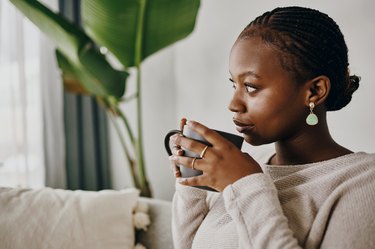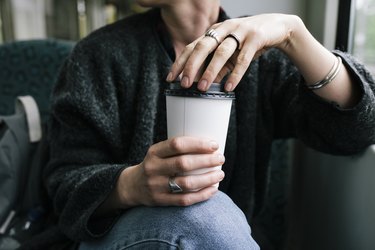
For many people, the day doesn't truly begin without a hot (or iced) cup of coffee. But in order to maximize its energizing effects, the best time to drink coffee might not be right when you wake up.
If coffee is an essential part of your morning routine or you use it when you need some extra focus, there may be perks to delaying your first cup.
Video of the Day
Video of the Day
Tip
"If coffee helps you feel alert and focused without an energy crash, this is usually a good sign. If you feel anxious, jittery, starved, depressed, nauseous or so wired you can’t sleep, think again about coffee or caffeine in general," Kylene Bogden, RD and wellness advisor for Love Wellness, says.
The Best Time to Drink Coffee
Mid-Morning
Coffee has caffeine in it, and the stimulant can raise your cortisol levels. Cortisol is the body's main stress hormone, and it helps to regulate our metabolism, immune system and blood sugar among other functions, Bogden says.
Our cortisol levels naturally spike and peak about 30 to 45 minutes after waking up — and because cortisol stimulates our metabolism, it leads to more energy and alertness during this time of the day, according to a June 2016 study in Emotion.
To avoid a big spike in cortisol, have your first cup of coffee about an hour after you wake up.
"Some research says that cortisol is still high from sleep when you first wake up and so it's better to wait for your coffee and have it mid-morning when cortisol is lower," says Lauren Slayton, RDN.
Before Exercise
Some people start their day with coffee, while others turn to it when they need extra energy, like before working out.
"Coffee's effects are felt fairly soon after drinking it. So if you're looking to boost a workout or you have important work to do, I'd suggest having your cup of coffee 30 minutes prior," Slayton says.
Having coffee before a workout can help you before and while you exercise, by giving you more energy, helping with focus and coordination and decreasing your perception of pain, per a December 2016 review in Neuroscience & Biobehavioral Reviews.
After a Poor Night's Sleep
Coffee is a popular go-to whenever you need to feel extra focused before an important task, like before a test or a big presentation at work. It may also come in handy when you've missed a night of sleep.
In an October 2016 study in Sleep, researchers assessed the amount of caffeine it took for sleep-deprived people to feel like they'd gotten a full night's sleep and found that with caffeine, you can reach peak alertness by drinking:
- 200 milligrams (or about 2 cups of coffee) right when you wake up
- 200 additional milligrams 4 hours later
How Much Coffee Should You Drink?
The U.S. Food & Drug Administration (FDA) recommends taking in no more than 400 milligrams of caffeine per day, or about 4 or 5 cups of coffee.
For people who have a caffeine intolerance or sensitivity, it may be helpful to lower or eliminate caffeine from your diet. "We suggest people max out at 2 cups of coffee and then have green tea or matcha if they want a boost," Slayton says.
"Too much coffee can lead to unexplained anxiety, insomnia, high cortisol and jitters," Bogden says.
Too much cortisol can negatively affect your immune system and blood pressure, but researchers have also found that the effects of caffeine on cortisol were reduced in people who drank coffee every day, according to an older, but often-cited September 2005 study in Psychosomatic Medicine.
Whether or not you have coffee on an empty stomach also matters. "Pair your coffee with a balanced, protein and fat-rich meal for a slow release of caffeine. Caffeine on an empty stomach can raise cortisol and cause blood sugar issues," Bogden says.
The Worst Time to Drink Coffee
Having coffee later in the day can also affect your sleep quality.
Caffeine has the ability to enhance performance, but one of the side effects of caffeine is sleep deprivation, according to a December 2018 study in Risk Management and Healthcare Policy.
Drinking coffee before the afternoon is best if you are sensitive to caffeine.
"Coffee has a long half-life, meaning it takes a long time for your body to clear it. For those sensitive to caffeine, I'd suggest no coffee after mid-day, " Slayton says.
Tip
If you're having sleep issues, try drinking your coffee (and any caffeine) before mid-day.
Does the Type of Coffee Matter?
Coffee has been linked to health benefits, such as better focus, less inflammation, longevity and improved heart health. To maximize these potential benefits, Slayton suggests going for roasts with more polyphenols, which are plant compounds with antioxidant effects.
"Light and medium roast coffee have more polyphenols," she says.
"The goal is really just to focus on quality coffee," Bogden adds. "Organic is a great first step and then you can determine your threshold." And if coffee gives you the shakes or keeps you up at night, then decaffeinated options are your best bet.
"Those who are sensitive to caffeine should consider trying decaf coffee. Please keep in mind decaf coffee still has some caffeine, but 20 to 40 milligrams is much better than 50 to 100 milligrams for these people," Bogden says.
Tip
Light and medium roast coffee, which has more polyphenols, may offer the most health benefits. Decaf is a great option for those who are sensitive to caffeine.
The Bottom Line
Some research suggests that the best time to drink coffee may not be immediately after waking, because caffeine raises cortisol and cortisol is already high at this time of day.
Drinking coffee 30 minutes before a workout might enhance your energy and improve your performance.
Having a cup of coffee right when you wake up may be helpful if you haven't gotten a full night of sleep, but caffeine and coffee are not long-term solutions to sleep deprivation.
Research shows that light and medium roast coffee may be the most beneficial to your health because they are higher in polyphenols. On the other hand, drinking too much coffee can cause side effects — such as anxiety and insomnia — because of the caffeine.
Per FDA recommendations, don't exceed 400 milligrams of caffeine — or 4 to 5 cups of coffee — per day.
- Antioxidants (Basel): "Do Coffee Polyphenols Have a Preventive Action on Metabolic Syndrome Associated Endothelial Dysfunctions?:" An Assessment of the Current Evidence
- Emotion: "Positive Upshots of Cortisol in Everyday Life"
- FDA: "Spilling the Beans": How Much Caffeine is Too Much?
- Risk Management and Healthcare Policy: "Effects of Caffeine on Sleep Quality and Daytime Functioning"
- Psychosomatic Medicine: "Caffeine Stimulation of Cortisol Secretion Across the Waking Hours in Relation to Caffeine Intake Levels"
- Sleep: "A Unified Model of Performance for Predicting the Effects of Sleep and Caffeine"
- Neuroscience and Biobehavioral Reviews: A review of caffeine’s effects on cognitive, physical and occupational performance
Was this article helpful?
150 Characters Max
0/150
Thank you for sharing!
Thank you for your feedback!

